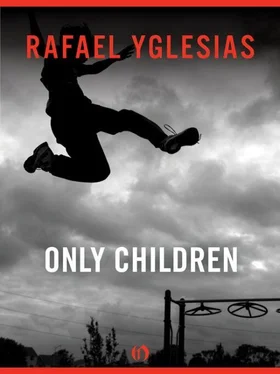Rafael Yglesias - Only Children
Здесь есть возможность читать онлайн «Rafael Yglesias - Only Children» весь текст электронной книги совершенно бесплатно (целиком полную версию без сокращений). В некоторых случаях можно слушать аудио, скачать через торрент в формате fb2 и присутствует краткое содержание. Город: New York, Год выпуска: 2010, ISBN: 2010, Издательство: Open Road Integrated Media LLC, Жанр: Современная проза, Домоводство, Юмористические книги, на английском языке. Описание произведения, (предисловие) а так же отзывы посетителей доступны на портале библиотеки ЛибКат.
- Название:Only Children
- Автор:
- Издательство:Open Road Integrated Media LLC
- Жанр:
- Год:2010
- Город:New York
- ISBN:9781453205167
- Рейтинг книги:3 / 5. Голосов: 1
-
Избранное:Добавить в избранное
- Отзывы:
-
Ваша оценка:
Only Children: краткое содержание, описание и аннотация
Предлагаем к чтению аннотацию, описание, краткое содержание или предисловие (зависит от того, что написал сам автор книги «Only Children»). Если вы не нашли необходимую информацию о книге — напишите в комментариях, мы постараемся отыскать её.
Set in a milieu of material excess and limitless ambition,
skewers new parents who expect perfect lives, but also offers an intimate look at the trials all new parents face as they learn how to nurture.
This ebook features a new illustrated biography of Rafael Yglesias, including rare photos and never-before-seen documents from the author’s personal collection.
With insight and candor, Yglesias recounts five years in the lives of two yuppie couples, to whom parenthood occasions typical tribulations and discouraging self-assessments. Byron’s birth exacerbates the problems between Diane and Peter Hummel (she’s a Yale-educated corporate lawyer, he’s a wealthy fundraiser for the arts). While she foolishly tries to be super-mom, wife and professional, she also puts pressure on Byron to excel, attempting to enroll him in an elite school and forcing him to play the violin. Peter withdraws from them both after Byron’s presence activates long-dormant memories of his icily aloof mother. Investment counselor Eric Gold, obsessed by the humiliation of his father’s business failures, frantically pushes himself to produce substantial earnings for his wife Nina and their son Luke. Her imagined inadequacies torment Nina, especially when she cannot soothe Luke, whose colic makes him infuriatingly uncontrollable. This is a vivid description of how rearing a first child can conjure up neurotic fears, which must be resolved before parents can nurture their offspring. Yglesias has abandoned the cynicism that infused Hot Properties; this new novel is deeply felt and thought-provoking. $75,000 ad/promo; Doubleday Book Club main selection; Literary Guild featured alternate.
Copyright 1988 Reed Business Information, Inc.
"The joys of Motherhood. Are they all one great lie?" In carefully orchestrated, parallel stories of two New York couples and their sons from birth through age five, Yglesias explores this and other contemporary parenting issues. The story moves carefully between the Golds and the Hummels in a sort of literary counterpoint that becomes more staccato in the second half of the book. Educated professionals with good incomes, both sets of parents have excellent intentions but are crippled by emotional "baggage": they are adult children ("only children") themselves. The children are unusually bright, but their development, like their parents’, is impeded by complex psychological issues. Yglesias writes with insight, showing how true adulthood comes with self-awareness, pain, and understanding. Definitely recommended.Ellen R. Cohen, Rockville, Md.
Copyright 1988 Reed Business Information, Inc. From Publishers Weekly
From Library Journal













